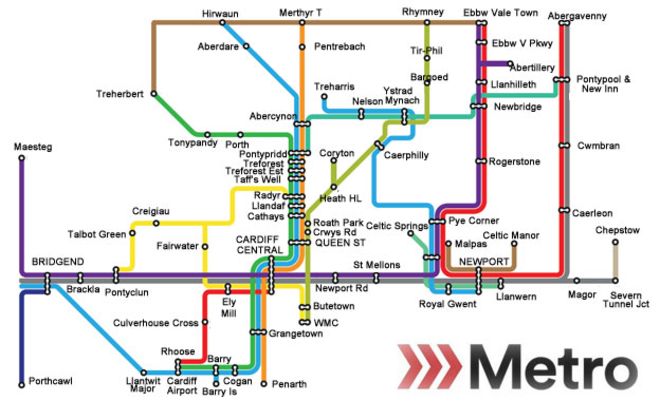
The Welsh Government has a total and unwavering commitment to the Metro project, Economy & Transport Secretary Ken Skates has told AMs in a written statement.
Responding to opposition criticism that the Welsh Government is wavering, watering down or altering its support for the massive transport network, he said the scheme would have to be completed in structured phases.
“Wales has been badly let down over recent years in relation to rail infrastructure by the UK Government, receiving little more than one per cent of rail infrastructure enhancement funding since 2011, despite having eleven per cent of the England and Wales rail track network.
“That is why when I was first appointed as Cabinet Secretary in May 2016, I made it abundantly clear to officials that a fundamental priority of mine was to maximise the upcoming opportunity we had through Metro and the new Wales and Borders Rail franchise from 2018 – the first the Welsh Government had ever helped design – to radically improve the way we travel. I wanted us to create a world class, multi-modal public transport system in Wales that had integrated rail, bus and active travel infrastructure at its heart,” said the Secretary.
He said it would mean new rolling stock, improved stations, the benefits of new technology, greater capacity and more frequent trains as a minimum.
“We took that into the conversations we had with the public and following a major consultation last year on the design of the Wales and Borders service including the Metro, we published “Rail Services for the Future”, a document which outlined the benefits that people can expect from Metro services, including improved and more reliable journey times, integrated services and ticketing, enhanced passenger information and better access to trains and stations.
“What the public told us was that our plans had to go beyond a traditional transport project – they had to become the spark for wider economic renewal in the communities in which they lived. It had to help individuals, businesses and communities that need a reliable, integrated transport system to help them find a new job, support their business to expand and bring new investment to their town.
“We’ve seen a glimpse of that recently with the decision I took to locate the new headquarters of Transport for Wales in Taff Vale, something which has already helped encourage new jobs and new growth into the wider Pontypridd area. “
He went on, “I also want to reinforce what I have said previously that there is absolutely no question about the Welsh Government’s commitment to funding that Metro vision. We have committed close to £750m of investment to take forward the next phase of the South Wales Metro project and have been clear as a Welsh Government that we also have the funding to support the proposed new M4 Relief Road, too. This is not a question of one project competing with the other – that approach fundamentally misunderstands the scale of the problem and that the overriding strategic need of the Welsh economy is to have both. That is why we have committed to funding both.
“However, whilst I would dearly love to wave a magic wand and have a fully developed, integrated Metro finished tomorrow, that simply isn’t possible. Every major infrastructure project is built in phases and the most important work at the start is to develop solid foundations on which future extensions can then be built.
“That is no different with the South Wales Metro and we have already invested £77m in phase one, including Ebbw Vale and the extension of Ebbw Vale town and capacity enhancements on that line.”
The ambitious and challenging transformation of the Victorian lines running through and to the north of Cardiff Queen Street are the priority for phase two modernisation.

Phase two involves transferring those lines to Welsh Government ownership and in partnership with the new franchise operator completely modernising them so they become the platform to deliver the ‘turn-up and go’ upgrade promised with a minimum of 4 services per hour. Some valleys stations will see 12 services per hour. The journey time savings and carbon reductions of this will be an important economic driver for the region, as well as help in reducing CO2 emissions.
“Phase 2 will be fully operational by 2023. I completely reject the suggestion being made that Metro is simply an upgrade of the current network – as I have said it is merely the start which makes everything else possible. Indeed, we have already begun the important planning work for future Metro phases which includes exploring a series of opportunities with the Cardiff Capital Region, such as strategic Park and Ride, network extensions and new transport interchange projects. I have also begun work looking at how elements of these future Metro phases could be delivered earlier.
“I also completely reject the suggestion that there has been any cancellation or scaling back of the South Wales Metro ambition in recent weeks. No potential schemes have been cancelled. The documents that have been cited from the Transport for Wales website are part of a Strategic Environmental Assessment (SEA) for the foundations of the whole of the South Wales Metro (inclusive Phase 2), but as I have also explained above, future phases will clearly go beyond these initial plans.”
He concluded by telling AMs, “Nothing in the current SEA precludes these future developments – but they are the necessary work to make them possible. Once the procurement process has completed we will be in a position to provide a detailed map of the proposed Phase 2 Metro solution along with frequency and rolling stock enhancements, in parallel with continuing to develop and deliver future phases.
“It is important to stress that the Wales and Borders franchise covers the whole of Wales and I have equally ambitious plans for Metro in North East Wales, as well as helping support the initial work on Swansea Bay Metro, too.”

